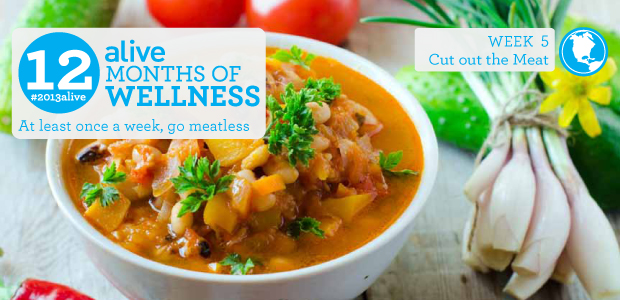Advertisement
#2013alive: Cut Out the Meat
We’re in the home stretch of month 7 in our 12 Months of Wellness series. This month we’ve been looking at ways to save our planet—a little bit at a time. This week, we’re cutting meat out of our diet—at least once a week. It’s the meat we eat Did you know that one of … Continued

We’re in the home stretch of month 7 in our 12 Months of Wellness series. This month we’ve been looking at ways to save our planet—a little bit at a time. This week, we’re cutting meat out of our diet—at least once a week.
It’s the meat we eat
Did you know that one of the leading causes of climate change just happens to be something many of us eat? Factory-farmed meat is, according to the United Nations’ Food and Agriculture Organization, “one of the world’s most pressing environmental problems, including global warming, land degradation, air and water pollution, and loss of biodiversity.”
The land cleared of natural vegetation to provide room for the animals to roam, the production of chemical fertilizers used to produce the food they eat, and the methane spewed into the atmosphere by their byproducts all contribute to a heavy load on our environment.
What can we do?
Cutting back our consumption of these meats can go a long way toward helping our environment.
- Replace or forego meat in your diet at least once a week.
- Choose meat alternatives such as tofu, grains, legumes, seeds, or nuts.
- When you do eat meat, choose organic and lean options.
- Reduce serving sizes of meat to no more than 3 ounces (85 grams)—about the size of a deck of cards.
- Try our Meatless Monday recipe options on alive.com.
Try these recipes
To help you with your once-a-week menu plan, check out Meatless Proteins for good advice about how to eat healthy vegetarian meals and for some delicious meatless recipes.
What’s your plan?
Do you have any ideas about how you’d like to replace meat in your diet at least once a week? We’d love to hear about it. We’d especially like to hear about your own favourite meatless recipes. Just drop us a line via blog posts or Facebook comments, or by using the Twitter hashtag #2013alive.





